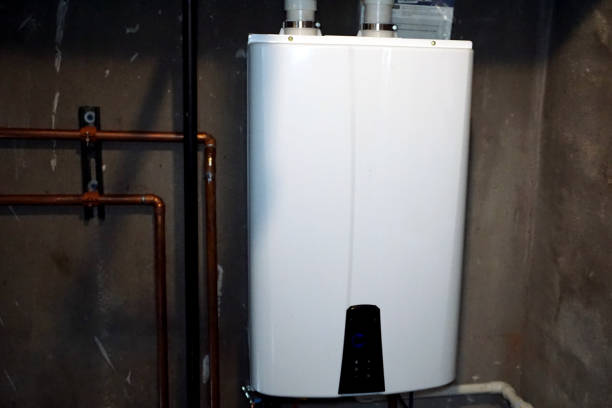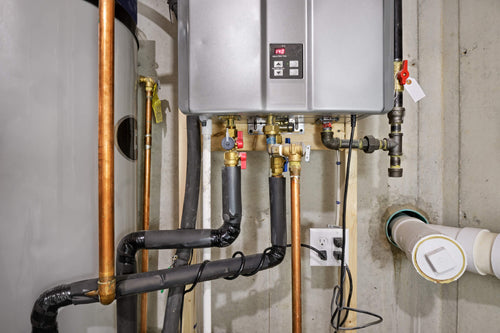Essential Benefits Households Realize From Tankless Water Heaters
Essential Benefits Households Realize From Tankless Water Heaters
Blog Article
Were you trying to locate resources concerning Six Benefits of a Tankless Hot Water Heater?

In a world where benefit and effectiveness preponderate, it's no surprise that home owners are frequently looking for smarter means to manage their home's power consumption and comfort. One innovation that has actually gradually gained popularity is the tankless hot water heater. But exactly what makes these systems stand out from the standard tank-based versions a lot of us matured with? Let's dive in and check out the advantages of tankless hot water heater, assisting you make a decision if it's time to make the switch in your house.
Intro
Picture this: you step into the shower after a long day, expecting a calming waterfall of warm water, just to be welcomed by icy beads since the last individual used all of it up. Audio acquainted? Traditional water heaters store a fixed quantity of warm water, suggesting you're at the mercy of that container's supply. Tankless systems, on the other hand, warmth water as needed. No more running out mid-shower, no more wrestling with timetables just to guarantee warm water is readily available.
Recognizing Tankless Hot Water Heater
What Are Tankless Water Heaters?
Tankless hot water heater, often known as on-demand or instantaneous hot water heater, give hot water just as it's required. Rather than keeping gallons of pre-heated water, these devices kick into activity the moment you activate the faucet. Water goes through a warmth exchanger, heating up in real-time, indicating you get an undisturbed flow of warm water without the requirement for a big tank resting lazily by.
Exactly how Do They Vary from Conventional Equipments?
Traditional heating units hold a storage tank of warm water, making use of energy to keep that storage tank at a constant temperature level. Tankless systems get rid of the standing supply, cutting down on wasted energy and the large impact of a big cylinder. Basically, you're updating from a "stockpile" way of thinking to a "made-to-order" approach.
Common Kinds Of Tankless Units
Tankless water heaters usually come in two selections: gas and electric. Gas designs often tend to supply greater flow rates, ideal for bigger homes, while electric models frequently offer smaller sized homes and are typically easier to mount. Furthermore, some systems are designed for point-of-use (offering one fixture) while others can handle the whole home's hot water needs.
Trick Advantages of Tankless Water Heaters
1. Unlimited Hot Water Supply
Ever before needed to arrange showers so everybody gets their reasonable share of hot water? With tankless, that comes to be a distant memory. As long as the heater's flow capacity isn't exceeded, you can take back-to-back showers without developing into a popsicle.
2. Power Efficiency and Cost Savings
Say goodbye to warming a titan tank's worth of water and keeping it toasty all the time. Tankless heating units minimize standby energy losses, which can lower utility costs. While the first price could be greater, the long-lasting savings usually validate the investment.
3. Space-Saving Design
If your home is short on storage, getting rid of the bulky container liberates useful space. Tankless devices are small and can usually be installed on walls, tucked away in edges, or set up in tight utility closets without grabbing all of the entire area.
4. Longer Life expectancy
A well-maintained tankless hot water heater can outlive its tank-based cousin. Typical containers might last 10-15 years, while tankless designs can maintain chugging along for twenty years or more, making them a solid investment with time.
5. Improved Water Quality
Storing water in a storage tank can in some cases cause debris build-up or a somewhat "off" preference. With tankless systems, fresh water is warmed on the spot, decreasing the opportunities of sediment accumulation and possibly supplying cleaner-tasting water.
Considerations Prior To Changing
Though the advantages are engaging, it's important to think about a couple of variables before totally devoting.
First Financial Investment Prices
Tankless heating systems normally include a higher in advance cost. Between the device itself and possible installation alterations, the preliminary price may give you sticker label shock. But keep in mind to see it as a lasting financial investment.
Installation Needs
Relying on your home's framework, you could need extra electrical ability or gas line upgrades. Ensure you comprehend the setup requirements and consult with a professional to avoid surprises.
Reviewing Your Home's Water Use Patterns
If your home concurrently makes use of numerous components with high warm water need, make certain the system's flow rate meets your needs. Recognizing your usage patterns helps you select the appropriate dimension and kind of tankless heater.
Upkeep and Care Tips
Tankless systems are relatively low upkeep, however they aren't set-it-and-forget-it appliances.
Regular Cleaning and Descaling
Hard water minerals can accumulate in the warmth exchanger, influencing performance. Routine descaling (usually advised each year) maintains the system going for peak performance.
Yearly Professional Assessments
A yearly checkup from a professional guarantees minor problems are caught early. They'll evaluate the system's performance, look for leakages, and aid keep optimum performance.
Ensuring Appropriate Air Flow
For gas versions, proper ventilation is important to securely eliminate exhaust gases. Make sure venting systems are tidy and appropriately mounted to stop any type of prospective security hazards.
Contrasting Different Brands and Models
Not all tankless water heaters are developed equal.
Investigating Dependable Manufacturers
Search for reputable brand names with a background of creating high quality units. A trusted supplier frequently gives much better consumer support and longer warranties.
Checking Out Testimonials and Individual Responses
User testimonials and feedback from next-door neighbors or friends who have actually gone tankless can offer valuable understandings. Occasionally, real-life experiences can be much more informing than advertising and marketing brochures.
Installment: DIY or Expert?
While some home owners relish tackling projects themselves, tankless setup might not be the most effective time to break out the toolbox.
Pros and Cons of Do It Yourself Installation
A DIY mount could conserve cash, but it includes risks. Inaccurate installment can lead to ineffectiveness or security worries. If you're handy and have experience, it might be feasible-- yet wage caution.
When to Call a Professional Plumbing Technician
For the majority of, calling a professional ensures every little thing's done correctly. A specialist plumbing recognizes regional codes, sizing demands, and venting criteria, decreasing the threat of mishaps.
Making best use of Efficiency
You've purchased a tankless device-- currently optimize its performance.
Optimum Temperature Level Setups
The majority of people set their units between 120-140 F. Adjusting the temperature level can boost convenience and financial savings. Experiment to locate a pleasant place that doesn't lose power.
Coupling With Low-Flow Fixtures
Wish to stretch your device's capacities? Think about setting up low-flow showerheads and taps. They lower water usage, enabling your tankless system to provide a steady stream of hot water without straining.
Ecological Effect
Tankless hot water heater line up with greener living goals.
Lowered Carbon Footprint
By utilizing less energy and just heating water as required, tankless systems can lower your home's carbon footprint, decreasing your ecological effect.
Preserving Natural Resources
Less energy intake and much less wasted warm water equate into less natural deposits being used, an environmental win-win.
That Benefits A Lot Of from Tankless Heating units?
The beauty of tankless heating units is that they can match a range of families.
Huge Families vs. Single Owners
Large family members could enjoy the endless hot water supply, while single owners appreciate the energy financial savings from not warming an entire tank for just someone's early morning shower.
Property Owners with Minimal Space
If your home is short on square footage, losing the cumbersome tank frees up area for other basics-- or maybe simply much more elbow room.
Eco-Conscious Customers
Going tankless aligns with eco-friendly values, ensuring you're not squandering power or resources.
Future Patterns in Tankless Hot Water Heater
The world of home devices is ever-evolving, and tankless hot water heater are no exemption.
Smart Home Integration
Envision adjusting your water heater's temperature level via an application or getting upkeep signals on your phone. As smart home technology breakthroughs, we'll see even more connectivity and convenience.
Improvements in Technology
R&D is regularly boosting warmth exchangers, making units a lot more reliable and durable. Future models may be also quieter, more compact, and much better fit for differing climates.
Final thought
Selecting a tankless hot water heater is more than just upgrading your home's hot water system; it's purchasing long-lasting comfort, energy performance, and a greener way of life. By considering your home's water usage, bearing in mind installment needs, and dedicating to regular maintenance, you can enjoy a constant stream of hot water without the luggage of a bulky storage tank. As technology advances, you can eagerly anticipate also smarter, more efficient tankless options that not just make your life easier however likewise profit the planet.
Why You Should Consider a Tankless Water Heater for Your Home
Energy Efficiency and Cost Savings
Tankless water heaters, also known as on-demand water heaters, heat water only when needed. This means they don't waste energy keeping a tank of water hot constantly. This efficiency translates into substantial cost savings on your monthly energy bills.
Endless Hot Water Supply
One of the significant advantages of tankless water heaters is their ability to provide a continuous supply of hot water. Traditional tank water heaters have a limited capacity and can run out of hot water, especially during peak usage times. In contrast, tankless water heaters can provide an endless stream of hot water, making them ideal for larger families or homes with high water usage.
Space-Saving Design
Tankless water heaters are compact and take up significantly less space compared to traditional tank heaters. They can be installed on walls, under cabinets, or even outside, freeing up valuable space in your home. This makes tankless water heaters a great option for smaller homes or properties with limited space for a traditional water heater.
Longer Lifespan and Lower Maintenance
Tankless water heaters typically have a longer lifespan compared to traditional tank heaters. They can last up to 20 years or more with proper maintenance. Additionally, tankless systems are designed with replaceable parts, which can extend their lifespan further and reduce long-term maintenance costs.
Environmentally Friendly
Reducing energy consumption not only saves you money but also benefits the environment. Tankless water heaters contribute to a smaller carbon footprint by using less energy to heat water. Their energy efficiency and ability to minimize standby heat loss make them an eco-friendly choice for environmentally conscious homeowners.
Customized Temperature Control
Tankless water heaters offer precise temperature control, allowing you to set the desired temperature to meet your specific needs. This level of customization ensures you always have water at the perfect temperature for your comfort and usage requirements.
https://beantownservices.com/blog/consider-tankless-water-heater-for-your-home

I ran across that blog entry about Unveiling the Hot Trend: The Benefits of Tankless Water when doing a lookup on the web. Don't hesitate to set aside a second to distribute this post if you enjoyed it. Many thanks for being here. Return soon.
More Details Report this page